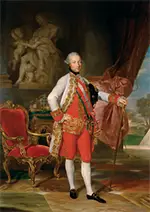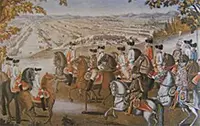Joseph II: Holy Roman Emperor
Joseph II was Holy Roman Emperor for 25 years in the second half of the 18th Century. He emerged from his mother's shadow and became a proponent of enlightened absolutism. 
He was born on March 13, 1741, at Schönbrunn Palace, in Vienna. His father was the eventual Holy Roman Emperor Francis I, and his mother was the Holy Roman Empress, Maria Theresa. When Joseph was born, his parents were fighting the War of the Austrian Succession, a consortium of European powers that challenged Maria Theresa's right to inherit the imperial throne from her father, Charles VI. Joseph was his parents' eldest son and so was the heir apparent; he had an education and upbringing to match. The preparation included a proper wedding, which Joseph achieved in October 1760 by marrying Isabella of Parma, the granddaughter of France's King Louis XV. Two years later, they had a daughter, Maria Theresa. Both wedding and birth occurred while Austria was in the middle of fighting the Seven Years War, a conflict that engulfed Europe and featured fighting in many places around the world. Isabella died in 1763; the twin causes were smallpox and complications from a difficult childbirth, of a girl who died not long after being born. Joseph had greatly loved Isabella and had no interest in marrying again. Nonetheless, he did so, to Princess Maria Josepha of Bavaria, daughter of the usurping Holy Roman Emperor Charles VII. The couple married in 1765, and Maria Josepha died two years later, of smallpox. Joseph did not marry again. His only surviving child, Maria Theresa, died in 1770, of pleurisy. Joseph's grief extended to that for his father, Francis, who had died suddenly, on Aug. 8, 1765. At that time, Joseph had succeeded his father as Holy Roman Emperor, becoming co-ruler along with his mother. Maria Theresa, by and large, ran the empire. Joseph did act independently in some cases, including in endorsing the First Partition of Poland, in 1772 and in commanding troops bent on retaking Bavaria in the War of the Bavarian Succession. When Maria Theresa died, on Nov. 29, 1780, Joseph ruled the empire in his own right. (He had other titles as well, having been named King of the Romans in 1764 and holding that crown until he became Emperor, when he also became Archduke of Austria; his other crowns included those of Bohemia, Croatia, and Hungary.) He was very much a proponent of the Enlightenment, a movement emphasizing reason and happiness that was sweeping Europe at the time, and saw himself as a paternal figure for his subjects. He acted to guarantee freedom of worship and made elementary education compulsory for both boys and girls. In an attempt to enforce unity, he made German the official language of government and business throughout the Empire. One of his more wide-ranging initiatives was to grant full legal freedom to serfs. He also followed in his mother's footsteps, spearheading a complete reform of the imperial legal system, including outlawing the death penalty. 
Outside the Empire, Joseph traveled to Russia in 1780, meeting with Catherine the Great and other government officials. The resulting alliance led to the Austro-Turkish War, which was largely an imperial disappointment, except for the retaking of Belgrade. Joseph watched with concern the early events of the French Revolution. His sister was Marie Antoinette, the Queen of France. Joseph sought to help her and her husband, Louis XVI, to escape; those plans did not come to fruition. In his last years, Joseph suffered from poor health and adverse reactions to his reforms. He reluctantly reversed some of his most treasured policies. He governed largely alone in his last few days, dying on Feb. 20, 1790. His younger brother Leopold succeeded him on the imperial throne. |
|
Social Studies for Kids
copyright 2002–2024
David White




